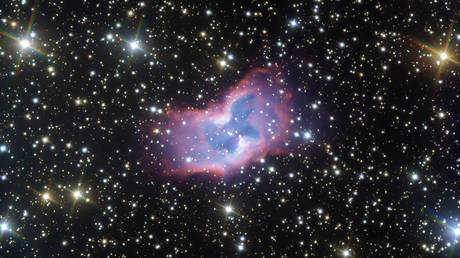
Newly taken pictures show an interstellar phenomenon fluttering its ethereal wings in stunning detail. The spectacular display comes from a highly symmetrical gas nebula known as NGC 2899.
The image was captured as part of the European Southern Observatory’s (ESO) Cosmic Gems program, for the purposes of education and public outreach.
Peering into deep space through the ESO’s Very Large Telescope, astronomers enjoyed a view of the huge bubble of glowing gas, in a near-symmetrical shape resembling a butterfly, between 3,000 and 6,500 light years away from Earth.
Though the nebula was discovered by British astronomer John Herschel in 1835, no one has ever seen it in such high resolution before.
The butterfly’s wingspan reaches nearly 19 trillion kilometers, or two light years. It is also incredibly hot, as the hydrogen and oxygen which make up its ‘body’ are heated to around 10,000 degrees Celsius (twice as hot as the Sun) thanks to two stars in its center, which are believed to give it its symmetrical appearance.
The NGC 2899 can only be viewed from the Southern hemisphere, and only through a powerful telescope – aptly known as the Very Large Telescope – which is conveniently located in Chile.
Its four 8.2-meter telescopes have discovered numerous images of deep space objects, such as the first known interstellar asteroid and light from a gravitational wave source, among others.
If you like this story, share it with a friend!




